Fanny Mendelssohn Hensel Was Enthusiastically Encouraged to Pursue a Musical Career by Her Family
Every bit you know I am very rarely at a loss for words. I am tonight as I sit downward to start to explore the lives of seven female composers and the social and political worlds in which they lived. Thus the following pseudo-oxymoron; I accept a few also many thoughts about how to write this Corner.
I take decided to ask you to read the iii posts, titled MMF Celebrates Women Composers, ( part 1 , part ii , and part 3 ) on our MMF website. They cover 5 of the composers I shall discuss. Read a biography posted before you read my thoughts about a particular composer or all 3 posts before you bring together me in my corner. The bios are informative and give the facts and I shall elaborate and comment on each musician. I know a adept flake nearly 4 of the brilliant women, merely almost nil about the others and their music. I add bios of Fanny Mendelssohn Hensel and Cécile Chaminade. (Who, you enquire?) Then non to waste product my words, onwards I go.
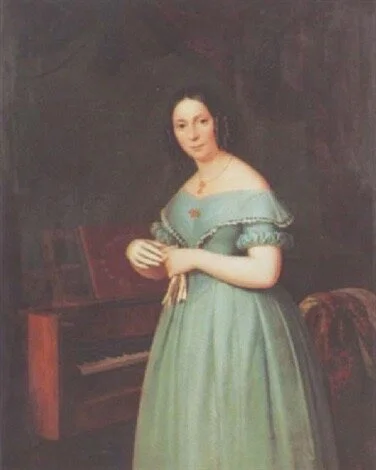
Portrait of Louise Dumont Farrenc
First upwards chronologically is Louise Dumont Farrenc, 1804-1875, Parisian. I call her Lucky Louise. She grew upwards in a family of well-respected artists; iv generations of Dumonts were well-known sculptors. Her grandfather, father, and her blood brother won the Prix de Rome for sculpture.
Now, did you notice the date of her nativity? What happened in 1804? Test your memory! You just read the news of the year in my Beethoven Corner. Napoleon, much to Beethoven's disgust, had declared himself Emperor. Louise was born into a world that would be the middle of political turmoil. The years from 1804 to Napoleon's final defeat in 1815 were years of French domination throughout Europe. Only the British remained unimpressed past the Emperor. The years of Louise'south life were surrounded by political unrest in France, and many parts of Europe. The economical wellness of France suffered and they had food blights and shortages. I note that nowhere in my researching these women of the so-called "long century" did I find specific references to hardships because of the ongoing power struggles that surrounded their lives during the first half of the 19th Century.
Dorsum to Louise. Equally you may have read she entered the prestigious Conservatoire de Paris as a student of harmony and piano, just women were not immune to matriculate in the field of composition until 1870. Anton Reicha, a prominent professor and composer was her private composition teacher. He was a good friend of Beethoven's who fled Vienna when Napoleon was heading there. Reicha was the author of a treatise on composition and course; specifically a theory of thematic representation in what some merits to be Reicha's new term "sonata class". He named the two main themes as "idées mères" and everything else as "idées accessoires". No distinction between the 1st and 2nd themes and no "pères" themes. A lot has been made of the female person designation as a metaphorical term; i.e. for the ability to give nascency and create. I wonder what Reicha'due south students made of this terminology, especially the females. His students included Berlioz, Gounod, Liszt, and Frank, and aye, other women students besides Louise. Louise became known as a most accomplished pianist. She married a musician, a flautist. Louise left the school and they went off on a concert tour across France. Farrenc retired from concertizing and became a well-known music publisher. Once again Lucky Louise! Her married man published her works and continued to encourage her in her performing career. She was appointed Professor of Piano at the Paris Conservatory and continued to compose. Though she was overly modest and self-critical she demanded equal pay for her educational activity after the success of a major work, Nonet, in Eastward Flat Major, Op. 38 and she did eventually receive it. Information technology certainly did not hurt that the famed violinist Joseph Joachim took role in the premiere of the piece! In the male-dominated profession it is not surprising to larn of Louise's insecurity, is it? Do listen to this romantic piece. It has magical solo violin moments and splendid writing that highlights the individual timbres of all the instruments. While you lot are on YouTube give a listen to her Symphony No. 3. Oh, I near forgot to mention; there are 3 gorgeous Sonatas, Op. 46 for piano and cello. Lucky us that Louise had a husband who recognized her astonishing talents.

Portrait of Fanny Mendelssohn Hensel
Plenty near the fortunate Farrenc. What of Fanny Mendelssohn Hensel her German contemporary? Quite a different story. Born in 1805, Hensel died of a stroke in 1847 while attending a rehearsal of a Cantata, 1st Walpurgis Dark equanimous by her brother, Felix Mendelssohn. This sad fact fits with the story of her cursory life. She was a very fine pianist, although there is evidence that she merely gave three public performances. To be distributed widely, her compositions were often presented every bit those of her blood brother, and and then only because she begged him to practice so. When Queen Victoria asked Mendelssohn to accompany her while she sang her favorite song that he had written, he had to confess his sister had equanimous the piece. Speaking of songs, yous probably know that Mendelssohn composed many Songs without Words. They were popular and specially favored by amateur pianists. Fanny wrote many works in this genre; some earlier Felix! They are short, lyrical, sentimental, and fairly easy to perform. The piano was considered a necessary possession in middle and upper-course homes and making music within a family or having salon recitals was the fashion.
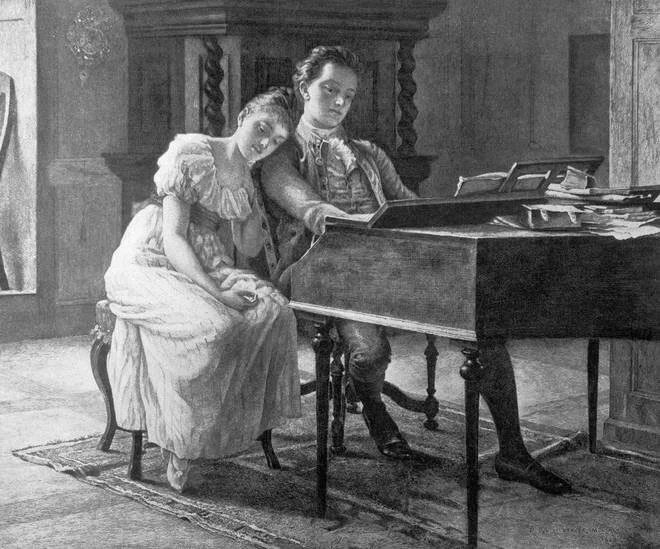
Sketch of Fanny and her brother Felix at the piano
Fanny and Felix shared a fine musical education. Fanny's mother taught her piano and especially the works of J.S. Bach. Loftier praise came Fanny'southward mode when the siblings' limerick teacher alleged, "She plays like a man." Her parents were tolerant of her composing but did non sanction her publishing whatever works. They were happy to further her piano studies; having a skilled daughter who could entertain guests was a social plus. Her male parent wrote her;
"Music volition possibly go a profession for your brother Felix but for you lot information technology can and must be an decoration."
"You should pull yourself together and collect yourself. Yous should brainwash yourself more seriously and assiduously towards your real goal that is as housewife, the only profession for a girl."
Uffda!
In her mid-twenties, Fanny married Wilhelm Hensel, an Italian artist. They had ane son. They spent a year in Italia with their son and Fanny thrived on the travel and the friendships they fabricated. She was fabricated to feel worthy every bit a musician and as a woman. Of particular influence was her friendship with Charles Gounod. Her musical diary, Das Jahr is a calendar month by calendar month business relationship of that holiday year. Her married man added delightful illustrations to her manuscript score. In her diaries again I annotation that like Farrenc in Paris, Hensel never mentions politics or uprisings. Italian republic was in political turmoil, and on the brink of fighting for Risorgimento (unification). Italia was ruled by local counts including those from the House of Hapsburg. Remember Beethoven's friend and patron, Prince Rudolph?
Fanny continued to compose and finally, in 1846 she published a collection of her songs. She wrote over 450 pieces, over 250 were songs. There are several chamber works and cantatas equally well as the Songs without Words. Well-nigh of this large collection was published because of the back up of Wilhelm. Felix had gone on tape as agreeing with his father that women should non publish their works. Still, this lovely letter has merely kind thoughts to impart to his sis when she did publish some pieces. Felix wrote to Fanny:
"May you take much happiness giving pleasance to others…may the public pelt you with roses never with sand."
Encouraged by her married man, Fanny did host salons every Sunday for many years. The aristocracy of the artistic earth attended these concerts. Musicians were hired and Fanny did perform her works at these gatherings. Among the regular attendees were Berlioz, Lizst, the poet Heinrich Heine, and our adjacent female person composer, Clara Wieck Schumann.
Given her social background, Fanny Hensel struggled to "rest her social expectations within her artistic energies." Always a dutiful child and ever a supporter of her successful brother, she remained relatively unknown equally a composer. She wrote of her own work, "Lieder suits me all-time…just a pretty thought without much potential to be adult." It is to be noted that Fanny only played the piano. She did not attempt to play whatsoever other instrument. She proclaimed that she never felt completely comfy composing sleeping accommodation and orchestral music. On International Women's Day in 2010, her lovely Easter Sonata was performed at a commemoration. What is and then interesting about that? For over 150 years the piece was attributed to you know who. Fanny had asked Felix to publish it. The Sonata only was discovered in her autograph in 2010. Fanny has ever been a parenthetical note to her brother's fame. How sad! Her music is so often spirited and energetic and gratuitous of formal constraints. Her style exhibits delightful word-painting and harmonic wanderings. I hear a great bargain of Schubert in her melodic phrasing and descriptive piano accompaniments. Dare I add the word romantic to the listing? Your telephone call. I urge you to acquaint yourself with her musical legacy.

Portrait of Clara Wieck Schumann
Clara Wieck Schumann'due south life spanned the "Long 19th Century" (1819-1896). She is the other German Composer on this list. Her fame rests primarily as a brilliant pianist who took the continent by storm. She was pushed and promoted by her father, Friedrich Wieck, a renowned piano instructor, piano shop proprietor, music critic, and disciplinarian father. Her parents divorced and per German language custodial law, she was raised by her father as a child could only remain with the female parent until the age of five.
Like Louise and Fanny, her globe was filled with music. Her early life was almost Mozart like in that her father toured Europe promoting her and performing with her from the age of twelve. The posted bio tells of her early compositions and her romance with young Robert Schumann. Her break from her domineering father came when she toured Paris alone in 1839. (Did Louise Farrenc attend her concerts?) Her compositions became known as she sometimes performed them at her concerts. Her works for piano and bedchamber music were widely praised and different Fanny, they were published nether her own name from the first of her career. She performed the premiere of her simply Piano Concerto in A minor, Op. 7 in her hometown in 1835 with the Leipzig Gewandhaus Orchestra under the baton of Felix Mendelssohn. How well did she know the Mendelssohn family?
Her romance and eventual marriage to Robert Schumann is indeed a saga all its own. Her begetter was against her relationship with Robert from the commencement. Wieck's objections to the young composer were primarily concerning his stability as a prospective husband. In light of what we now know was to exist Schumann's troubled life, it seems reasonable that Wieck was extremely concerned about the choice Clara had made. Merely ally him she did! Did she become Mrs. Robert Schumann and end to be Clara, the musician? Did she devote her energies to supporting the male talent? The answer is "yep"; in many ways, this was her life until Schumann died in an asylum at the historic period of 46 in 1856. Clara had eight children, (i died), concertized, and composed all the while managing her husband'south career. Her total number of works is very small compared to Farrenc's and Hensel's, only they did not accept seven children to heighten and a household to manage and Robert so emotionally needy and dependent. Robert wrote;
"Having children and a husband who constantly improvises does not fit together with composing. Clara knows her master occupation to be a female parent."
She wrote late in life;
"I one time believed that I had creative talent, just I have given up that thought; a woman must non want to compose—there has never yet been one to do it."
Quite a statement every bit she must have been very familiar with Fanny Hensel'due south works and probably her contemporaries' as well from France and America.
Germany's political ups and downs into the 1820s are comments found in my last corner near Beethoven. In the second half of the century, Germany had the same riots and uprisings as Italia and to some extent France during the rest of the century. Advocates for unification squared off against the old line elite. Campaigns for freedom of the printing and a national parliament, trial by jury, and cries for the abolition of the aristocracy and privilege were prevalent. Once again, I found no footnotes concerning any disruptions in the professional person or social life Clara led due to political events; non even references to food shortages or economic downturns.
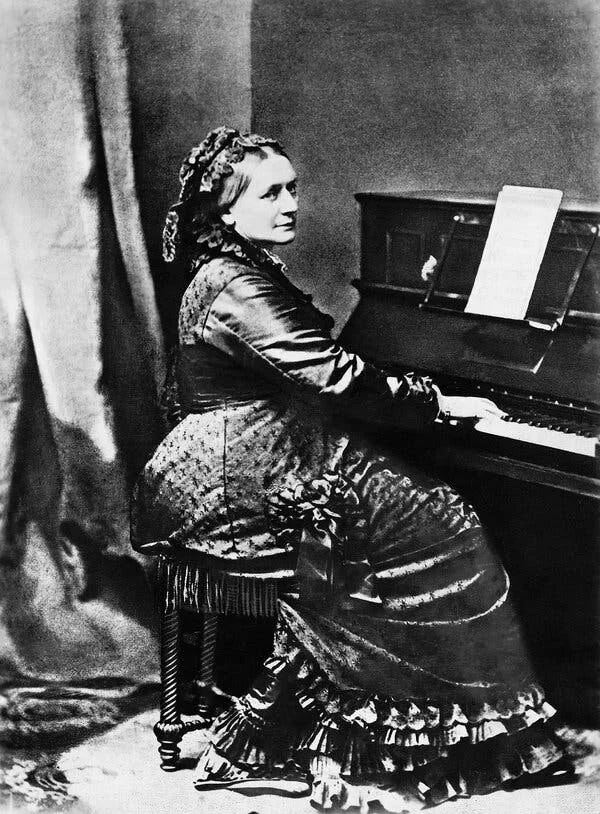
Photo of Clara Wieck Schumann at the piano
She continued to concertize throughout her long life. At historic period 59 Clara accepted the position every bit head pianoforte instructor at the prestigious Hoch Conservatory in Frankfurt where she taught until 1892, iv years before her death. Her reputation as an artist attracted many students and she was referred to as Frau Kammervirtuosin (Bedroom virtuoso). As for Brahms, you all know that he came to run into Robert and the balance is history. After Robert'south death, Clara was e'er in affect with Brahms. If you are interested in their human relationship their letters make bully reading. There is no need here to speculate further about their enduring friendship; or was it a love thing?
Now get listen to Clara's sleeping room music, her Piano Concerto, and annihilation else you find on YouTube!

Portrait of Mélanie Bonis
A fascinating story unravels when reading about Mélanie Bonis. I promise you take read her "romance novel" bio. Born in mid-19th century Paris to a non-musical centre-form family, she was a religious young woman who taught herself to play the piano and with the encouragement of a horn professor at the Conservatory, she did finally convince her parents to allow her to pursue musical studies. By the time she attended the school, women were allowed to attend classes in composition every bit well as harmony. César Frank was i of her teachers as she sat with Debussy in classes. She felt discrimination as a female among the many men and called herself Mel and then as to lessen her identification as a female person. Every bit the posted bio relates, she fell in dearest with a handsome poet and music critic. Her parents forbade the marriage calling artistic piece of work "dangerous". Despite winning awards and gaining recognition for her compositions her parents forced her to quit school. I am writing of the 1880s, not 1820 and 30s. Nonetheless, her parents arranged a wedlock for her to a human 25 years her senior. He came to the wedlock with five children. She gave him three more than. Her businessman married man had no involvement in music. For years Mel was simply Madame Domange. She lived the life of a wealthy housewife. She managed an active social life and music seemed to be gone from her earth. Now for the romance novel: she re-met her first love, the poet. He brought her back into the creative world. Though he had married, they had an matter and a child! Of course, Mel had to give the kid, a girl named Madeleine, up and this broke her spirit completely. When her married man and her lover's wife had died, Mel was able to have her illegitimate girl come alive with her equally an orphan of the war. 1 more twist for a novel, Madeleine roughshod in love with her one-half-brother every bit she did not know she was Mel'due south girl. Mel had to tell this to the young girl, thus making life even more painful for the girl and the mother. In her old age, Mel and her daughter became close.
She composed some 300 works; many works for children, for organ, and a capella religious choir pieces. I particularly bask her piano works for piano four easily. I most interesting piece of work is a portrait written for orchestra, Three Women of Legend, Salome, Ophelia and Cleopatra. She was welcomed into Guild for Composers of Music. Massenet, Fauré and Saint-Saëns were nifty admirers of her music. Sadly, here is 1 more couched compliment coming out of the prevalent skeptical attitudes of the era. Gounod wrote afterwards hearing her Piano Quartet No.one in B flat major, Op. 69;
"I had never believed that a woman could write something such as this. She knows all the tricks of the trade."
Pierre Monteux, longtime Maestro of the BSO, was the violist at the premiere of the piece.
Practise yourself a favor, get to know Mel Bonis's music. Do yous beloved music for the flute? She was a master at composing for the musical instrument. I am enamored of Scènes de la Forêt, for flute horn and piano.
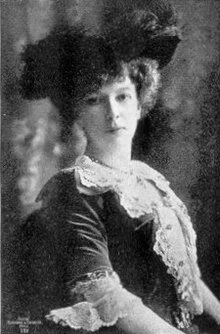
Portrait of Cécile Chaminade
Now for a proper name that I am about sure you do not know. Or perhaps I am incorrect. Are you as old equally I am? Did your family accept a piano that played piano rolls? If the respond is, yeah, possibly the proper name Cécile Chaminade strikes a bong. Here in the Usa, her piano works were all the rage during the era of pianoforte rolls, and she became extremely pop. My folks had such a piano. Her Scarf Trip the light fantastic was my mother's favorite curl after anything played past Gershwin. Chaminade was born in Paris in 1857, living almost the identical years every bit Bonis. Her begetter was a violinist who idea his daughter should not be musically educated and forbade her entry into the Conservatory. Her female parent was a pianist and vocaliser who gave Cécile her kickoff piano lessons. At age 8 she played for Bizet who urged her parents to let her be taught. They then allowed private lessons just constantly told her not to become a professional person musician. Deprived of formal schooling she was subjected to criticism throughout her career. Not to be deterred, she equanimous from an early age and continued to do so for many years. Nigh of her 400 works were small pieces with descriptive titles. At that place are 200 or so for piano and 100 plus songs. She wrote several big works; a ballet score, an opera, a Concertino, Op 107 for flute and orchestra, and Concertstück that she performed with the Philadelphia Orchestra in 1908 for her American debut. They are assuming and exciting pieces.
In NYC the aforementioned year, the critic of the NY Post wrote well-nigh a Carnegie Hall operation; "While her music has a certain feminine daintiness and grace it is amazingly superficial…the whole concert confirmed the confidence held by many that while women may someday vote, they will never learn to etch anything worthwhile." How does ane survive such blatant prejudice and criticism?
Chaminade married a prominent music publisher when she was almost fifty. She commented upon matrimony saying; "Information technology is difficult to reconcile domestic life with the artistic. When a woman of talent marries a man who appreciates that side of her such a marriage may exist ideally happy for both." Unfortunately, her husband, much older than she, died later six years of the marriage. She received the Legion of Award in 1913. Queen Victoria was her friend and admirer. She said The Silvery Band was one of her favorite songs. Retrieve Victoria's love of a song written past Fanny?
Her compositions are indeed calorie-free and many are short, but they are intricate in their rhythmic details. The word "mannerly" written so oft as the descriptor for Chaminade'due south pieces should be used every bit a compliment, not the put down that critics intimated when writing words similar "her music is salon fare, often charming, but not memorable." And so why did Scarf Dance sell 5 million copies? Chaminade frequently added Castilian flare to her pieces. She used chromaticism with skill and her melodies were beautifully formed showing great understanding of the arching ebb and menstruum of lyrical phrasing. Her larger works were criticized for being masculine. She just could not win with the critics. The negative printing did her in. Having toured Europe and performed here she retreated to Monaco where she lived out her life lone and virtually forgotten after years of wild enthusiasm from audiences that enjoyed her so much. At the peak of her popularity, Chaminade Clubs were formed hither and in England to listen to her music and spread the discussion of her talents. In London, she made recordings of her works that are sought later treasures past record collectors. The piano rolls date from before the finish and after WWI. They are frequently up for auction on eBay.
Surely the judgments of the critics were gender-based and while Chaminade's large body of work was largely made upward of small works, the joy and attractiveness of her music is so worthy of our appreciation. Take fourth dimension to go to YouTube and enjoy her as audiences did in the early on 20th Century.
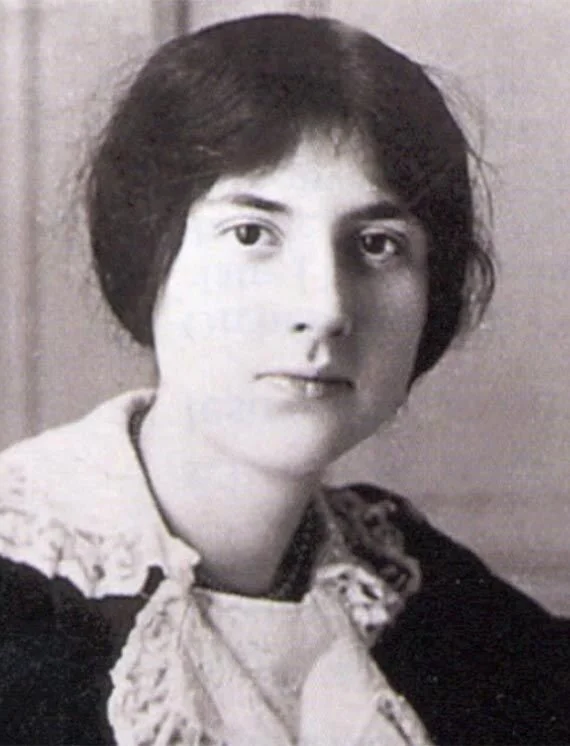
Photograph of Lili Boulanger
Do y'all know who Nadia Boulanger was? Well, exercise go observe out why she is so very important in the annals of great pedagogues. My connexion hither is to the adjacent female composer, Lili Boulanger, Nadia'southward younger sister. Her bio on the website is excellent. What I wish to add together is a "what if she had lived longer" appreciation of her talents every bit a composer. She was sickly her entire brusk life, struggled to proceed composing and confronting all odds worked tirelessly to write amazing works that depart from familiar harmonic construction, that overwhelm with emotional touch on and speak to the harshness of the earth she experienced. Her sister took her away from Paris repeatedly to help her regain forcefulness after recurring illnesses. Lili won the Prix de Rome for Composition in 1913. She was the starting time woman to do so and the youngest competitor by 6 years in the year she won. Her Cantata, Faust et Hélène that won the prize should exist a must on all our listening "to do" lists. Her choral music is beyond beautiful. Information technology volition grab you and hold you. When Lili was well enough to go to Rome to savor her Prix de Rome time, she was greeted with mayhap the but overt gender prejudice she suffered in her curt life. The French Manager of University feared her presence and her mother's would undermine subject area at the school. She returned to France during WWI to assistance in the War attempt, organizing letter writing to the troops from Mézy where she and her family unit lived while Paris was under attack. Lili traveled to Italy in one case more where she worked on an opera. She became very ill and returned to Paris. Lili died in Mézy in 1918 in March simply months before the Armistice in Nov. When you listen to Boulanger, consider her musical palette. I suggest that you think of Debussy, Ravel, even Albéniz. Then think about what is original in Lili'southward music. She brings the whole range of impressionistic tools to express her own harmonic and textural effects. Sometimes dissonant, oft warm and anything but dissident, her voice is singularly beautiful. She brought Fauré'southward sense of orchestral color to her music and deep emotional melodic content. Every bit I wrote at the starting time of this commentary; what if she had lived longer than 24 years? Perchance you should listen to her Nocturne for Violin and Pianoforte first. There is a cute organisation made by her for flute and pianoforte. Then information technology is time for you to hear D'un Matin de Printemps.

Photo of Amy Marcy Cheney Beach
At present finally an American composer! Amy Marcy Cheney Beach. Born in 1867, she was a willful child prodigy. Built-in in New Hampshire, her family moved outside of Boston when she was viii years old. Her ability to improvise and to sing is reputed to accept been noticed when she was not yet three years old. She mentally composed intricate works for piano and set them down when she got to a piano. Practise you know what synesthesia is? It is defined as a "…sensation produced in ane modality when a stimulus is applied to some other modality…" Clear as mud? The best case is …" it is the sensation of hearing a sound that is visualized in a color." Amy had this foreign ability. Hearing a sure note triggered her visualization or sense of a sure color. I believe information technology. Amy's mother, like so many of the other composers we have reviewed, taught her the basics of piano performance. In Boston, she studied with leading pianists. She continued to etch. Her debut with the BSO was in 1883. She performed Chopin's Piano Concerto in F small. She received rave reviews. When she married Dr. Beach she agreed to lessen her concert schedule. But enter the domineering male person figure, he soon required her to only give i concert a year. And and so but if she was known equally Mrs. H.H.A. Beach. Dorsum to the cartoon board…i.east. back to serious composing she went. She started writing large works. The Symphony Society of New York performed a piece of work of hers. She was the first woman to be presented by that orchestra. She was commissioned to write a piece for the dedication of the Women's Edifice at the 1893 World's Columbian Exposition in Chicago. This is her stirring Festival Jubilate, Op.17. Her Gaelic Symphony, Op. 32 was heralded as grand and masterful. Information technology is recognized equally the first symphonic work by an American adult female. When Dr. Beach died in1910, Amy went to Federal republic of germany and England. She was welcomed equally a composer and pianist. She inverse her name back to Amy Beach. Interesting that back dwelling house in the states she one time once more assumed her married designation as her professional name. She toured and composed for the next 30 years. The MacDowell Colony in New Hampshire was the site of her annual working vacation for 20 years. She wrote several lovely works while enjoying her home land of New Hampshire.
Amy Beach died in 1944 in NYC at the historic period of 77. She left the rights to all her music to the MacDowell Colony. Royalties from her works help support the artists' retreat founded by the composer, Edward McDowell, and his married woman. Two mannerly pieces for piano, (and I utilize the give-and-take carefully after Chaminade's critics bandied the discussion around) were written during 1 summer at the Artists Colony. Do listen to The Hermit Thrush at Morning and The Hermit Thrush at Eve.
They are wonderful examples of Amy Beach's piano music and they are in marked contrast to her masterful symphonic efforts.
This has been a huge attempt. Seven female composers. Seven lives recounted. Seven amazing musical legacies left for u.s. to hear and savor. MMF honors female composers in commemoration of the anniversary of women's correct to vote under The Nineteenth Amendment, ratified August 18th, 1920. I am a feminist. A very onetime feminist! But truly from my corner, I cannot make any judgments near all the music I have heard this by ii weeks based on gender. Allow me know how you feel after yous hear the music and Adam's talk on June 30th and the Operation Chat on July 2nd.
Run across y'all next time for more Beethoven.
- Fran, from my corner
Source: https://www.mmfvt.org/frans-corner/2020/6/23/digital-season-46-female-composers-reconsidered
Postar um comentário for "Fanny Mendelssohn Hensel Was Enthusiastically Encouraged to Pursue a Musical Career by Her Family"